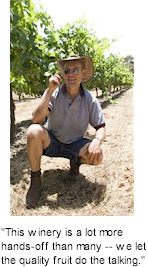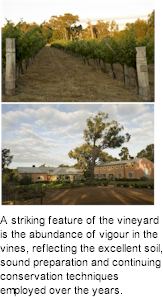


The property takes its name from the town of Fermoy, Co. Cork. Ireland which was founded by an ancestor of one of the original owners.

Its Cabernet Sauvignon scooped a Gold Sheraton wine award within its first year of production and its Merlot and Semillon have also been hailed at both wine shows and in the marketplace. The vineyard was established in 1985, and completed its first vintage in 1988. A total of 14 hectares is now planted which in full production should yield around 160 tonnes of premium fruit.
The winery was built in 1987 to the specifications of the Winemaker Michael Kelly, and has since been expanded to accommodate Fermoy Estate's dynamic growth from 120 cases at first vintage to more than 10,000 cases annually. While Fermoy Estate incorporates leading edge technology, it retains many Old World traditions. The vines are hand-pruned and hand-picked, and by careful fruit selection Fermoy is able to craft distinctive table wines full of unique flavours and characters.
Such high praise is acknowledged by Michael with characteristic modesty. He is happier pressing grapes than pressing the flesh at glamorous restaurant openings. But with dirt in his veins, it was almost inevitable that his career path led him to the rich soils and verdant vines of Margaret River wine country. A fourth generation farmer, his introduction to the wine industry was in 1980 when he was employed by Dr John Middleton at his Mount Mary vineyard in the Yarra Valley, Victoria.

A degree in wine science followed, a course which included a vintage at Domaine Louis Chapuis in the Burgundy region of France.After completing his education he returned to Western Australia and worked at Sandalford, Leeuwin Estate, and on the retail side of the business, before joining Fermoy Estate in 1987. Michael believes that the wines are only ever as good as their ingredients and consequently much effort is lavished on the Fermoy vineyards in the quest for prime quality grapes.
The ten hectare vineyard was planted in 1985, the main varieties being cabernet sauvignon and semillon with smaller parcels of sauvignon blanc, chardonnay, merlot and chenin blanc. The useful blending varieties of malbec and cabernet franc are also grown. To cope with the increasing demand for our products, the vineyard was expanded in 1995 by another 4 hectares. These vines will come on stream for vintage 2000, with an expected total yield of around 160 tonnes.
The soils are gravelly loam, ideal for grape growing, and much emphasis has gone into the cultivation of cover crops of clover and cereals. These are then turned back into the soil to provide a carpet of mulch around the vines as well as important organic matter. The other benefit of course, is the moisture retained in the soil. Less than 30% of the vineyard is irrigated, and then only to maintain the health of the young vines, although there is ample water stored in the two dams on the property.
A wide trellis system has been developed based on the work of Professor Carbonneau of Bordeaux, to expose more leaf area to sunlight, increase air circulation to minimize disease and maintain high quality fruit, whilst substantially increasing yields.